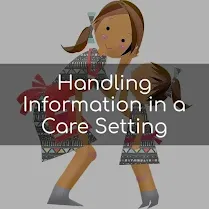Introduction:
Handling information in care settings is crucial for quality care and individual well-being. It involves collecting, storing, processing, and sharing sensitive data about patients' health, personal details, and treatment plans. Care providers must adhere to strict confidentiality protocols, follow legal guidelines, and maintain trust through proper documentation, training, and regular audits. Effective information handling improves decision-making, service delivery, and outcomes.
Information Security Principles
Learn the rules that apply to information security in healthcare environments. This programme provides important recommendations for managing information securely, including anything from data protection legislation to ethical issues. Recognise your responsibility for upholding honesty and confidentiality.
Techniques for Effective Communication
When processing information, communication is essential. Examine useful communication techniques that respect privacy while fostering accuracy and clarity. To guarantee efficient information transmission, learn how to accurately and securely document information.
Information Management and Technology
An important aspect of information management is technology. You will learn about the processes and technologies used to handle information in care settings in this module. Learn how technology may improve information security, from secure communication platforms to electronic health records.
Information Security in Care
This last topic will cover information security and its potential threats. Find more about typical threats including unauthorised access and data breaches. Find proactive ways to reduce risks and guarantee the integrity and security of the data.


.jpg)


No comments:
Post a Comment